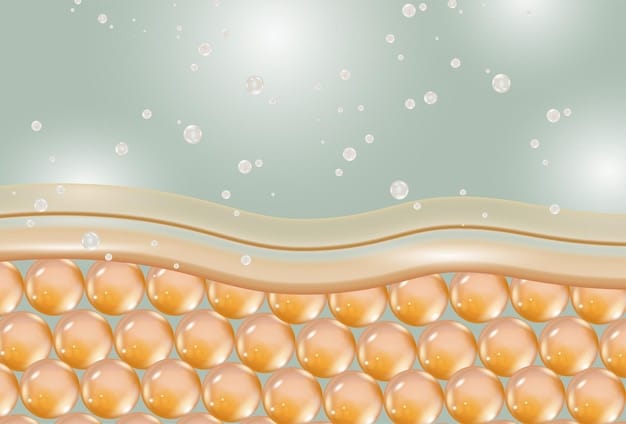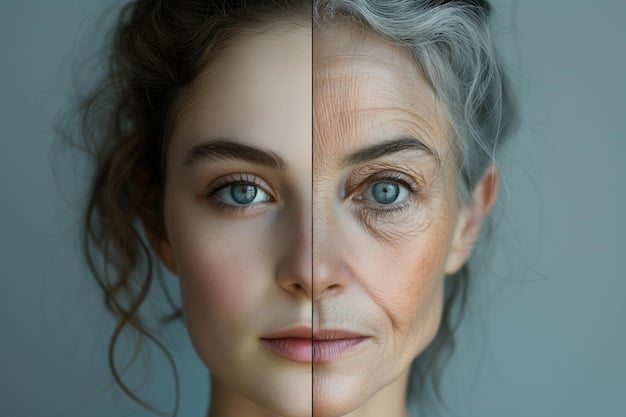Collagen Supplements: Do They Really Work for Skin Health?

Collagen supplements may offer skin health benefits by improving elasticity and hydration, but results can vary depending on the individual, supplement quality, and consistency of use, and further research is needed to fully understand their efficacy.
Are you wondering about the truth about collagen supplements: Do they really work for skin health? Collagen supplements have become increasingly popular, promising a range of benefits from reducing wrinkles to improving skin elasticity. Let’s explore what the science says.
What is Collagen and Why Does it Matter for Skin?
Collagen is the most abundant protein in the human body, playing a vital role in maintaining skin structure and elasticity. As we age, collagen production naturally declines, leading to wrinkles and skin sagging. This section explores the importance of collagen for skin health.
The Role of Collagen in Skin Structure
Collagen acts as the scaffolding of the skin, providing strength and support. It forms a network that keeps the skin firm and resilient. Understanding this foundational role is crucial when considering collagen supplementation.
How Aging Affects Collagen Production
From our mid-20s, collagen production decreases by about 1% each year. Factors like UV exposure, smoking, and a poor diet can accelerate this decline, leading to visible signs of aging. Knowing this can inform decisions about preventative and restorative skincare.
- Collagen provides skin with its structural integrity.
- Reduced collagen leads to wrinkles and sagging skin.
- External factors exacerbate collagen decline.

Collagen’s role in maintaining skin health is undeniable. Its decline with age makes supplementation a tempting option for those seeking to restore a youthful complexion. However, it’s essential to understand how collagen supplements work and whether they live up to the hype.
Types of Collagen Supplements Available
Navigating the world of collagen supplements can be overwhelming due to the variety of types and sources available. This section breaks down the main types of collagen supplements and their unique benefits.
Hydrolyzed Collagen
Hydrolyzed collagen, also known as collagen peptides, is broken down into smaller fragments, making it easier for the body to absorb. This form is widely used in supplements and is believed to be more effective at reaching the skin.
Marine Collagen
Derived from fish skin and scales, marine collagen is a type I collagen, which is the most abundant collagen in the human body. It’s considered highly bioavailable, meaning it’s easily absorbed and utilized by the body. Marine collagen is a popular choice for those seeking sustainable and effective collagen supplementation.
Choosing the right type of collagen supplement depends on individual preferences and dietary restrictions. While hydrolyzed and marine collagen are common choices, it’s important to consider factors like allergies and ethical concerns when making a decision.
Scientific Evidence: What Does the Research Say?
The effectiveness of collagen supplements for skin health is a topic of ongoing scientific research. While some studies show promising results, it’s important to approach the evidence with a critical eye. This section examines the current scientific consensus on collagen supplementation.
Studies on Skin Elasticity and Hydration
Several studies have found that collagen supplements can improve skin elasticity and hydration. A 2014 study published in Skin Pharmacology and Physiology showed that women who took collagen peptides for eight weeks experienced a significant improvement in skin elasticity compared to a placebo group.
Research on Wrinkle Reduction
Some research suggests that collagen supplements can help reduce the appearance of wrinkles. A 2019 meta-analysis published in the Journal of Drugs in Dermatology concluded that oral collagen supplementation is effective in improving skin aging signs, including wrinkles and skin elasticity.

- Collagen supplements can improve skin elasticity.
- Some studies show a reduction in wrinkle depth.
- More research is needed to confirm these benefits.
While the existing research is encouraging, it’s important to note that not all studies are created equal. Factors like sample size, study duration, and the type of collagen used can influence the results. Further research is needed to determine the long-term effects and optimal dosage of collagen supplements.
How to Choose the Right Collagen Supplement
With so many collagen supplements on the market, it can be difficult to know which one to choose. This section provides guidance on selecting a high-quality collagen supplement that meets your needs.
Look for Third-Party Testing
Choose supplements that have been third-party tested for purity and potency. Organizations like NSF International and USP verify that the supplement contains the ingredients listed on the label and is free from contaminants.
Consider the Source and Type of Collagen
Decide whether you prefer animal-based (bovine or porcine) or marine collagen. Also, consider the type of collagen (type I, II, or III) and choose one that aligns with your specific goals.
Selecting the right collagen supplement involves careful consideration of factors like ingredients, certifications, and personal preferences. By doing your research and choosing a reputable brand, you can increase your chances of experiencing the benefits of collagen supplementation.
Potential Side Effects and Risks
While collagen supplements are generally considered safe, it’s important to be aware of potential side effects and risks. This section outlines the possible adverse effects of collagen supplementation and who should avoid it.
Common Side Effects
Some people may experience mild digestive issues, such as bloating, heartburn, or diarrhea, when taking collagen supplements. These side effects are usually temporary and can be minimized by starting with a low dose and gradually increasing it.
Allergic Reactions
Individuals with allergies to fish, shellfish, or eggs should be cautious when taking collagen supplements derived from these sources. Allergic reactions can range from mild skin rashes to severe anaphylaxis. Always check the ingredient list and consult with a healthcare professional if you have allergies.
- Mild digestive issues may occur.
- Allergic reactions are possible.
- Consult a doctor if you have concerns.
Collagen supplements are generally safe for most people, but it’s important to be aware of potential side effects and risks. If you experience any adverse effects, discontinue use and consult with a healthcare professional.
Incorporating Collagen into Your Skincare Routine
Collagen supplements are just one piece of the puzzle when it comes to maintaining healthy skin. This section explores how to incorporate collagen into your broader skincare routine for optimal results.
Pairing with Topical Treatments
Using collagen supplements in conjunction with topical treatments like retinoids and vitamin C can enhance their effectiveness. Retinoids stimulate collagen production, while vitamin C protects collagen from damage. Combining these treatments with collagen supplementation can provide a synergistic effect.
Diet and Lifestyle Factors
A healthy diet rich in antioxidants, vitamins, and minerals supports collagen production and protects against its breakdown. Eating plenty of fruits, vegetables, and lean protein can complement the benefits of collagen supplementation. Avoid smoking, excessive alcohol consumption, and prolonged sun exposure, which can all damage collagen.
Incorporating collagen into your skincare routine involves a holistic approach that considers supplements, topical treatments, and lifestyle factors. By combining these strategies, you can maximize the benefits of collagen and maintain healthy, youthful-looking skin.
| Key Point | Brief Description |
|---|---|
| 💪 Collagen’s Role | Provides skin structure and elasticity, declining with age. |
| 🔬 Scientific Evidence | Some studies show improved skin elasticity and reduced wrinkles. |
| ✔️ Choosing Supplements | Look for third-party tested, consider the source (marine, bovine). |
| ⚠️ Potential Risks | Digestive issues and allergic reactions are possible. |
Frequently Asked Questions (FAQ)
▼
Collagen is a protein that provides structure and elasticity to the skin. It’s crucial for maintaining a youthful appearance and overall skin health. As we age, collagen production decreases, leading to wrinkles and sagging.
▼
Some studies suggest that collagen supplements can improve skin elasticity and hydration, as well as reduce the appearance of wrinkles. However, results may vary, and more research is needed to confirm these benefits.
▼
Collagen supplements come in various forms, including hydrolyzed collagen, marine collagen, and bovine collagen. Hydrolyzed collagen is the most common, as it’s easily absorbed by the body.
▼
Collagen supplements are generally considered safe, but some people may experience mild digestive issues, such as bloating or heartburn. Allergic reactions are also possible, especially if you are allergic to fish or shellfish.
▼
To maximize the benefits of collagen, pair supplements with topical treatments like retinoids and vitamin C. Also, maintain a healthy diet rich in antioxidants and avoid smoking and excessive sun exposure.
Conclusion
In conclusion, while collagen supplements show promise in improving skin health by enhancing elasticity and hydration, individual experiences can vary. It is crucial to consider the quality of the supplement, maintain consistent usage, and complement it with a healthy lifestyle and skincare routine. Further research will help clarify the full extent of their benefits.





